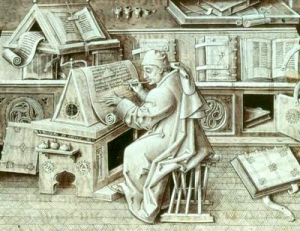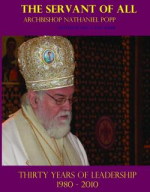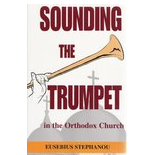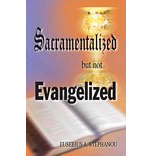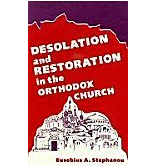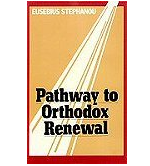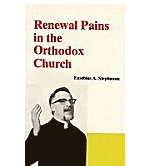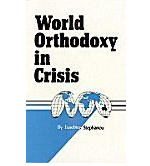Special Projects
The Project for Orthodox Renewal
The Board of Directors of Orthodox Christian Laity (OCL) presents the Project for Orthodox Renewal, seven studies of key issues facing Orthodox Christians in America written for the good of the Church. This publication enables OCL to fulfill its educational mission of providing the “royal priesthood” of believers, clergy, hierarchy, and other interested Christians with information that fosters meaningful discussion on renewal of the Orthodox Church in the United States.
Published 1993.

Occasional Papers
The Greek Orthodox Legacy in America: A Struggle for Relevance in an Unorthodox World
S.P. Stamatis, M.A. Published 2023. (#14).
Orthodox Unity, Evangelism, and the Problem of Universal Jurisdiction
Fr. Bohdan Hladio. Published 2023. (#13)
Papers in Support of A Declaration for Orthodox Christian Unity in America. Published 2022. (#12)
Orthodox Christian Laity Correspondence with Archbishop Elpidophoros Regarding the Greek Orthodox Archdiocese of America. Published 2021. (#11)
Remembering Orthodox Christian Laity Board Members: Eulogies and Tributes
George Matsoukas. Published 2020. (#10)
The American Orthodox Church is Holy, Catholic and Apostolic – It Must Now Be One
Published 2016. (#9)
Religious Pluralism, Fundamentalism and Contested Identities in North American Orthodox Religious Life: The Case of the Greek Orthodox Church in North America, Published 2018. (#8)
New Strategy Needed To Save Endangered Ecumenical Patriarchate
Peter Marudas. Published 2006. (#7)
Greek Philosophy and the Theology of the Greek Orthodox Church
John Mavroides, Ph.D. Published 2006. (#6)
An Orthodox Christian Church in the United States: Unified and Self-Governed
Peter Haikalis, Ph.D. Published 2000. (#5)
The Challenge of Outreach
Nikolas K. Gvosdev, Ph.D. Published 1997. (#4)
The History and Future of the Female Diaconate
Compiled by Timi Loomos Freshman (assisted by Valerie Karras, Demetra Jacquet and Dr. Ellen Gvosdev) by request of Archbishop Spyridon. Published 1997. (#3)
The Theological Foundation of the Role of the Laity in the Church
Daniel J. Sahas, Ph.D. University of Waterloo Ontario, Canada. 1997. (#2)
Transition, Renewal: One Faith, One Church
Bishop Iacovos of Catania. Published 1997. (#1)

Books
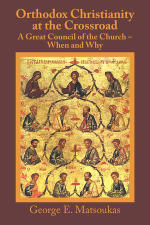

Edited by George Matsoukas, Executive Director of OCL. Published 2009.
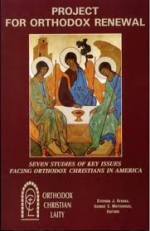

The Board of Directors of Orthodox Christian Laity (OCL) presents the Project for Orthodox Renewal, seven studies of key issues facing Orthodox Christians in America written for the good of the Church. This publication enables OCL to fulfill its educational mission of providing the “royal priesthood” of believers, clergy, hierarchy, and other interested Christians with information that fosters meaningful discussion on renewal of the Orthodox Church in the United States. Published 1993.
Order at Amazon, read online or download a pdf file.
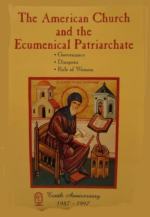

Alice Kopan, Editor, Published 1998.




Books by OCL Board Members
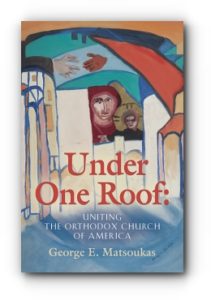

by George E. Matsoukas
This is the second collection of essays, compiled from opinion columns written during the period 2012-2020, when George Matsoukas served as executive director of Orthodox Christian Laity (OCL). The first collection, “A Church in Captivity: The Greek Orthodox Church of America,” is also a collection of opinion columns, this one written during the period 1990-2007. This series of observational essays can be considered a first cut in putting together the history of Orthodoxy in America during this 30-year period. These essays also tell the OCL story and provide an insight into how the organization functions.
The essays are written from the point of view of how societal events and concerned faithful were energized to advance the mission of Orthodox Christian Laity. OCL is a pan-Orthodox educational and advocacy ministry formed in 1987 to:
•advocate for the restoration and strengthening of the historic role of the laity in the conciliar governance of the Orthodox Church in the United States.
•support the spiritual renewal and regeneration of the Orthodox Christian Church in the United States in its Apostolic Mission.
•advocate for and promote transparency and accountability in the governance of the Orthodox Church in the United States.
•advocate for and champion the establishment of an administratively and canonically-unified, self-governing autocephalous Orthodox Christian Church in the United States.
Matsoukas’ musings in his first volume, “A Church in Captivity,” reflect the deep political changes transpiring after the “fall” of Communism in the captive “Orthodox” nations, and then in what manner those “national” churches began to respond to their “diasporas,” those still existing multiple jurisdictions in The United States.
This weighing of the ongoing strain between those who continue to uphold that “a unity through a simple Eucharistic oneness is sufficient” and those who insist on a “canonically unified Church administration” is the stuff of volume two, “Under One Roof: Uniting the Orthodox Church of America.” It is the fruit of the author’s essays of the past 13 years.
Matsoukas’ objective is to call us to be faithful to the Canonical Tradition of the Church so that it can bring forth the fullest witness of Orthodoxy through uniting all Orthodox in The United States. Considering the low percentage of Orthodox believers vis-à-vis others in this nation, the call to strength in unity makes practical sense as well. There is strength in numbers.
Matsoukas reminds us that although we seem to be under one Eucharistic roof, he calls for a oneness which must not be as a loose federation of jurisdictions dependent on Synods abroad, but an authentic unity in itself total, canonical, autocephalous, as other local churches each became.
The reader is grateful for the wide coverage given us of thirteen years of new Orthodox witness in the six divisions (Orthodox Christian Laity Story, Promoting Unity, Holy and Great Council, Assembly of Bishops, Greek Orthodox Archdiocese, Renewal) of this new volume. The reader can take each article, one by one, and enjoy the author’s convincing presentations, and then sit back and enjoy arguing with him! Can an assembly of jurisdictions occasionally gathered at an altar, receiving from one cup and one diskos, be the fullness of Orthodox witness under one roof? The author’s answer is an emphatic, “No!”
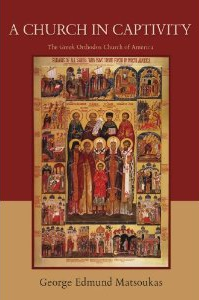

It is a disconcerting fact that decisions for Orthodox Christians living in North America are currently dictated by interests of foreign governments and patriarchates, all which contribute to spiritual indifference among the faithful. This collection of essays explores the loss of autonomy and unification within the Greek Orthodox Archdiocese and offers ways to create an all-encompassing church that respects cultures and philosophies.George Matsoukas, Executive Director of Orthodox Christian Laity in West Palm Beach, Florida and an active member of his local parish, diocese, and archdiocese, chronologically presents personal essays that respond to regression in the life of the church during a seven-year period. He encourages constructive change through effective communication and a partnership between the church and the laity, ultimately resulting in a church that is able to meet the spiritual needs of all its members.
George Matsoukas. Published 2008.
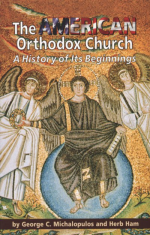

The American Orthodox Church — A History of Its Beginnings is the most up-to-date and complete history of the Eastern Orthodox Churrch as She has manifested Herself in North America. The authors masterfully trace the checkered past of Orthodoxy in North America from the eighteenth centry to our own day.
George Michalopulos and Herb Hamm. Published 2004.
His Eminence Archbishop Nathaniel Popp was elected to the Holy Episcopacy in October 1980, by the Congress of the Romanian Orthodox Episcopate of America and the Holy Synod of the Orthodox Church in America. In thirty years of his archpastorate, the number of parishes and clergy in his diocese tripled, communism fell, and the dream of Orthodox Christian unity in North America acquired new urgency. Here are the thoughts, exhortations and inspirations of the man chosed by God to shepherd the Romanian Orthodox Episcopate of America through these challenging and promising times.
Archbishop Nathaniel Popp. Published 2010.
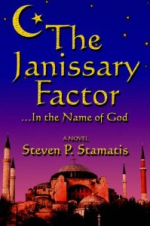

A seminary graduate at the crossroads of his calling, and full of memories and personalities who shaped him, Andy Theofanis faces a crisis in his faith. He revisits the ethnic coffee house (cafenio) of his childhood, hoping to connect with mentors from his past to help him settle his indecision about the priesthood. This personal struggle is triggered by the chaotic state of his church in America. Confusing administrative changes imposed by the faraway Patriarchate in Istanbul, Turkey, split the U.S. Greek Orthodox and threaten the future of his established church. Andy’s determination to find a rational explanation for the moves that turn back the clock for the church in America leads him to Istanbul. There, he stumbles upon an unthinkable plot 200 years in the making and about to be unleashed. The drama unfolds against the current global backdrop of Islamic terrorism and the enduring historic enmity between Turkey and Greece. Add to this the Greek world’s insistence that their Holy See remain in hostile Islamic territory, and a condition develops threatening the survival of an ancient faith-possibly Christendom itself.
Steven P. Stamatis. Published 2005


This is the story of a Greek Orthodox priest’s passionate search for spiritual renewal, and how God met that need both for himself pesonally and then generally for the Church at large. The journey of faith that Father Eusebius Stephanou embarked on proved in effect to be the history of renewal in the Orthodox Church of North America since 1968. The reader will find in this book a gripping account of the controversial events that marked the turbulent course of the renewal outreach he initiated.
Maria Stethatos. Published 2012




Books by Fr. Eusebios Stephanou
  |
A Manual on the Basic Principles of Orthodox Renewal
Sounding the Trumpet
Sacramentalized But Not Evangelized
Desolation and Restoration in the Orthodox Church
Pathway to Orthodox Renewal
Renewal Pains in the Orthodox Church
World Orthodoxy in Crisis

